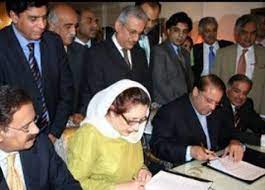By Syed Zahid Majeed
ISLAMABAD:The nation is celebrating the 17th anniversary of the Charter of Democracy (CoD), a momentous occasion that marks a significant milestone in Pakistan’s democratic history as former Prime Minister Benazir Bhutto and Supreme Leader of Pakistan Muslim League Nawaz (PML-N), Muhammad Nawaz Sharif, came together to sign this historic document, solidifying their commitment to a shared vision for the country’s future in 2006.
Pakistan’s major political parties, PML-N and PPP, marked the 17th anniversary of the “Charter of Democracy,” signed in 2006, this framework aimed to enhance the governance, democracy, human rights, and judicial independence. It advocated for constitutional reforms, transparent elections, devolution of power, and national security. The Charter has fostered political dialogue, improved relations and influenced Pakistani politics, although not all points have been fully implemented. Nonetheless, it remains instrumental in shaping the country’s democratic course.
During this crucial period, Benazir Bhutto and Nawaz Sharif’s visionary leadership reshaped Pakistan’s political landscape. They recognized that democracy flourishes when the voices of the people are heard and respected. Their legacy inspires leaders to prioritize dialogue, consensus, and the pursuit of national interests.
Seventeen years on, the enduring impact of the CoD can be seen in the progress made. It serves as a guiding light, reminding the nation of the importance of inclusive governance and the collective pursuit of national welfare. Challenges remain, but the ideals enshrined in the CoD propel Pakistan forward.
As we celebrate this milestone, let us recommit ourselves to the principles of justice, equality, and progress. By honoring the legacy of Bhutto and Sharif and upholding the ideals of the Charter, we pave the way for a brighter democratic future for Pakistan.
However, the legacy of the Charter has been overshadowed by the controversial entry of Imran Khan into the political arena. As the leader of the Pakistan Tehreek-e-Insaf (PTI), Khan’s rise to power introduced a different political approach that deviated from the principles outlined in the Charter. His confrontational approach has polarized the nation and undermined the unity and stability envisioned by the Charter.
Pakistan currently faces challenges posed by Imran Khan’s leadership, which has led to a fragmented society and diminished trust in democratic institutions. It is crucial to reinvigorate the spirit of the CoD, reignite dialogue among political parties, and reaffirm the commitment to democratic principles, justice, and equality. Political leaders must prioritize the collective welfare of the nation over personal interests and engage in constructive dialogue to address the country’s challenges.
Consequently, Pakistan now faces challenges stemming from Khan’s leadership, including a fragmented society and eroding trust in democratic institutions. To overcome these challenges, it is imperative to revive the spirit of the Charter, rejuvenate dialogue among political parties and reaffirm commitment to democratic principles, justice, and equality. Political leaders must prioritize the nation’s collective welfare over personal interests and engage in constructive dialogue to address the country’s pressing issues.



